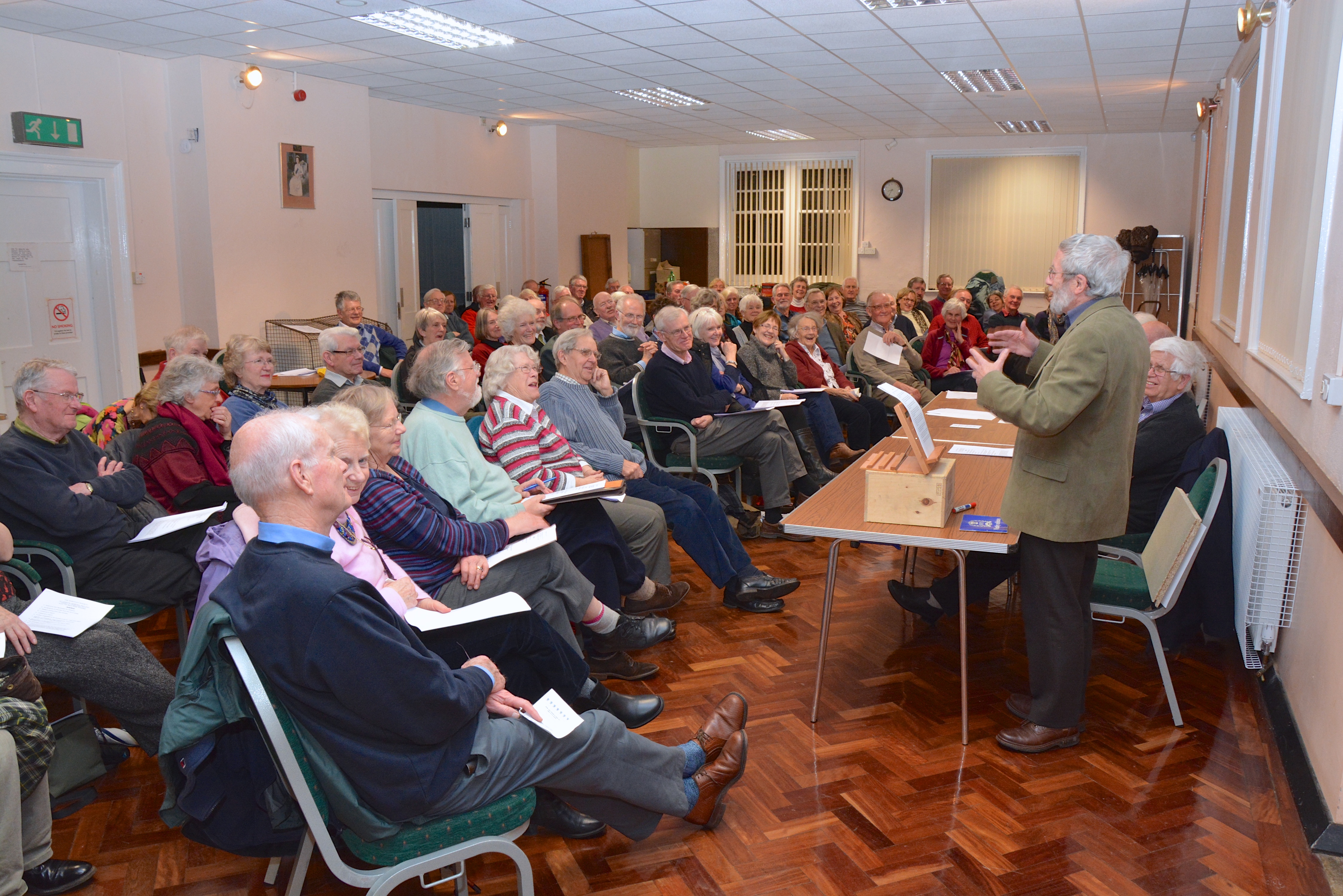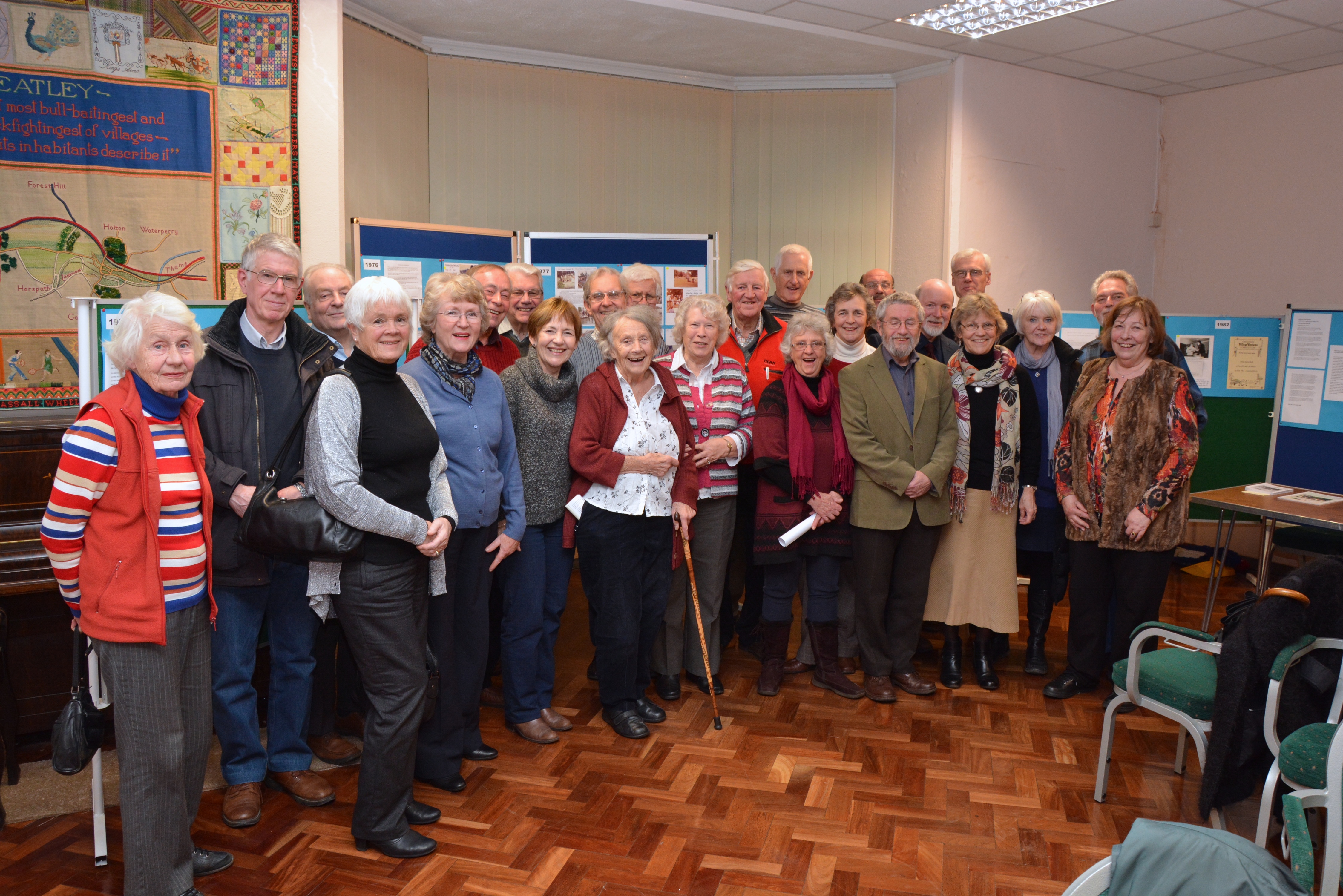Founding of the Wheatley Society
Transcript of the address by founder member Mark Bannister at the AGM of the Wheatley Society on 7 Feb 2014 – the 40th anniversary year:

I’ve been asked to recall the founding of the Wheatley Society. Before me, I see many faces that were there at the time. Where there are faces, there are memories. So I hope to be helped out with accurate information when my memories are faulty. Since it is still more or less the panto season, I hope to hear many cries of “Oh no it wasn’t!”.
It is necessary to recall the context of the early 1970s, since the Society emerged in response to a changing ethos. I’m not suggesting it was a revolution such as those of 1789, 1832 or 1968 but it was none the less a period when mind-sets were changing.
Wheatley had been expanding for some time. You only have to look at the older houses up Ladder Hill or down London Road, most of which can be dated to before World War II or maybe just after the War. But the place still had the feel of a village. There were plenty of old-established residents, many of them “characters” such as Tommy Barlow who kept pigs in the field that was to become Barlow Close, Mr & Mrs “Watery” Allen, the Munts of Littleworth who kept monkeys in their living-room. The village centre had quite a range of shops catering for most needs – Dallimore’s for groceries, Samuels the butcher’s, Mrs Dodd’s bakery, an ironmonger’s, Stevie Putt the cobbler …
There was a distinct sense of community. Partly this was provided by the pubs and the club together with a range of village organisations (churches, British Legion, Scouts, Women’s Institute et al.). But already some incomers were beginning to build up a stronger sense of village unity. Jon Drake, an anthropologist who was a particular authority on calendar customs, reformed the Morris Men, who had disbanded in 1870 when the bagman ran off with the money. The Wheatley Processional, specific to the village, became a feature of every event. Jon also re-established the traditional May Day celebrations, when the primary school children performed the old maypole dances and a May Queen was crowned. At Christmas, a group took the traditional Mummers’ Play round the pubs, being careful to stick to the time-honoured script for fear of being reprimanded by the locals: “you say the words as they’m always been said.”
But the expanding population felt that change was taking place without being monitored and properly assessed. The Parish Council was of course the statutory body representing the people of the village but a number of developments gave the impression that the PC either was powerless to affect events or did not care. For instance, when SODC decided to turn the old railway line behind Littleworth, closed in 1965, into a landfill tip, promising that there would be no smell and that the streams coming down into the valley would not be polluted, the residents of Littleworth had a strong feeling that they had been steamrollered. The promises proved worthless: the stench was appalling and the main stream turned black. A proposal to move the primary school from Church Road to a new site off Crown Road took the population off guard while its desirability seemed to be taken for granted by the PC.
Then the shops opposite the Merry Bells were built, an example of bog-standard 1960s architecture with no account taken of the fact that this was the old High Street. It was even worse when the Coop applied for permission to demolish ValeBrook Cottage next to the shops and build a supermarket. It was clear that this could well be the first stage of a domino effect, with any of the historic buildings being at risk from then on. Enough was enough. Over a few pints, a group of us decided it was time to bring together all those who thought that change in Wheatley ought to be monitored and tailored to the needs of the community. We delivered a flyer to every house in the village inviting all residents to a public meeting to discuss the situation.
On the appointed evening, the Merry Bells was packed, with standing room only for some. There was enormous support for a community body which would represent the views of the residents but as chairman I also picked up a strong feeling in favour of an umbrella organisation that would cover a range of specific interests. In other words, what was wanted was something more than the classic civic society to be found in many towns and villages which in most cases exists only to protect the local heritage. We appointed a steering committee to draw up proposals for a constitution. A month later, a draft constitution was considered and approved. As I had anticipated, the name chosen did not include the word ‘Civic’, indicating the desire for a much wider remit. The first committee was elected with Jon Drake as Chair and later, Dr Hassall, a respected academic who lived in the Manor House, was invited to become President. So the Wheatley Society was launched.
It quickly made its mark. The Environment Group enjoyed the great advantage of including Mike Vaughton, a practising architect, and John Minett, a professional town planner. Their expertise and experience helped the group to establish its credibility in relation to statutory bodies such as the SODC Planning Authority. We needed to show that we were not against change per se, but for judicious consideration of proposals in the light of all the impacts they might make. In the face of the attitude of one Old Guard member of the Parish Council who declared that, although conservation areas might be fine in a few places such as Castle Combe or Chipping Camden, there was nothing in Wheatley worth conserving except the Manor House, we launched a campaign to have a conservation area established covering key parts of the old village. This was backed up with a quasi-educational programme involving contributions to various exhibitions in the village.
The Group’s policy was essentially two-pronged. As indicated above, we set out to establish our credentials as people who knew what we were talking about so that the SODC would take us seriously. This approach was vindicated when the Society was asked to consult the village population to ascertain their views on a new Village Plan. We called a public meeting and drew up a report offering comments and proposals concerning the village envelope, development areas, etc. The second prong involved joining the statutory political process. Four of us stood for election to the Parish Council and, being all elected, thereby obtained some limited clout. Three years later, we put up a list of nine candidates for election under the banner ‘Village Concern’. Again, we were all elected and gained a majority on the Council.
The Drama Group quickly established a reputation for successful productions. A wealth of talent revealed itself, not only in acting but in directing, making scenery and props, music, lighting, front of house … . A series of pantomimes, many of them produced by Peter Wild, brightened up the winter season. For a time, the Group seemed to have a penchant for Victorian drama. Murder at the Red Barn, a melodrama, provided many opportunities for booing and hissing the villain, William Corder, as did Sweeney Todd, the Demon Barber of Fleet Street, a role custom-made for Alan Rooney. Even the Not the Twelfth Night Party, held in 1983, took the form of a Victorian music-hall. I have an enduring memory of Trude Hickey wearing boots and carrying a whip giving a heartfelt rendering of ‘I hate men!’.
In 1977, a busload of Wheatley thespians travelled up to the National Theatre to see Tony Harrison’s version of a cycle of medieval mystery plays. They returned bowled over and it seems to have been that experience that inspired Mick Jones to write his series of epic Wheatley-themed musical dramas. First was Wheatley 1870 which evoked extremely well the ethos of the village at that time – the tension between the vicar and the villagers, the types of entertainment that gave Wheatley its dubious reputation for rowdy pubs and cock-fighting. The Soldiers have Taken our Horses Away carried the focus forward to World War I with a remarkable pathos but still with a strong sense of the solidarity that characterised the village at war. Wheatleyshire looked to the future and reflected the period of its production with its concern for modern environmental problems. Bill Bryden, the director of the mystery plays at the National Theatre, responded to Mick’s invitation to visit a rehearsal and gave much-appreciated advice.
The Local History Group was set up by Margaret Rosenthal who led a small team of enthusiasts who researched into many aspects of Wheatley’s past. The result was a series of esteemed publications which laid the foundations for much later work, leading to the creation of the Society’s impressive website.
The Footpaths Group seems not to have come into existence at the launch of the Society but it certainly existed later because they produced a series of excellent leaflets for walkers and undertook essential development work such as building stiles and footbridges for the maintenance of the village’s network of paths.
Having left Wheatley in 1986, I cannot comment on events or activities after that date, but I keep in touch with the Society’s activities through email and contact with old friends as well as by attending the occasional meeting. I am glad to see it is still as dynamic as ever and clearly thriving. Long may it continue! I hope to be here in another forty years to raise a glass to the success of the Wheatley Society!


Leave a Reply